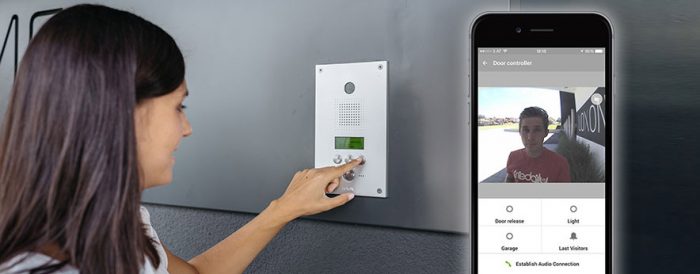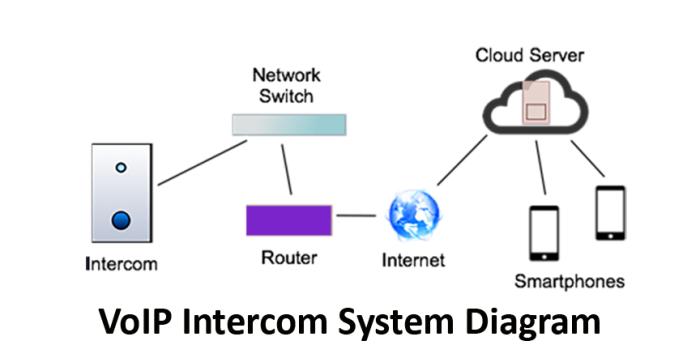VoIP is one of the leading phone systems for small businesses these days. It’s cheaper for many reasons. It has many security features and is literally almost fully customizable for a company’s needs. But what about when a business has a larger facility that requires them to have an intercom system? That’s where a VoIP intercom system comes in.
You know how it is – when you work in a multi-level facility. Sometimes you have to page a worker if they have an important phone call or an important meeting. Many companies still use intercom systems based on old landlines, but the times have changed. It’s all about the internet of things. That’s where a high-quality VoIP intercom system works better.
Why Intercoms?

A VoIP intercom system or IP intercom system is easy to use, inexpensive to run, and works well with businesses of all sizes.
With the use of an intercom system, you can literally dial anyone in the building like you would if you were calling them. These are perfect for door buzzers (the newer ones with cameras, smartwatch interfaces, etc.). You can even use a VoIP intercom system to connect to people directly and call their mobile devices, or even a PC device, making it a perfect way to get alerts directly to someone. Of course, there is still the feature where you can place your intercom call to a direct line that broadcasts over a series of building speakers, which is still heavily used today.
A VoIP intercom through your managed provider doesn’t cost anything, whereas in the old days, having the additional lines for your intercom on hardlines did. You needed to have access to the switchboards and, therefore, often have more than one line for calling out to the intercom system. Not only that, but intercoms were unidirectional – you couldn’t have a conversation with someone but could only broadcast.
This singleplex method was often harder to set up and even install. With a VoIP intercom system, you can actually set it up with multiplex settings so both sides of the line could talk. Basically, it would be the same as sending a speakerphone call to someone’s direct office line, or it’s much similar to how teller boxes work at a bank, for example.
Simpler Solutions

Having a VoIP intercom set up is much cheaper because it takes less work than your everyday phone lines. Since VoIP works on your network, you don’t even need to install additional phone lines. With an advanced system, you can literally have as many extensions as you want to be added to your PBX server and access them with your intercom system as well. Not only that, but all of the calls are completely free.
When you use a call from a PC to PC systems (or VoIP to VoIP systems in the same network), they are completely free. Other outside calls to landlines may have a price tag attached to them, but this all depends on what VoIP service you’re providing.
Some of the best VoIP software setups actually don’t cost any extra to make calls anywhere in the continental United States, and some even have the bonus of being able to call internationally for free – something you really can’t do with landline providers.
How Does VoIP Intercom Work?

This VoIP intercom system diagram shows how your message goes from the intercom box to your intended recipients.
One noticeable difference between a VoIP intercom and a landline version is how the messages are sent. With a landline connection, the call is placed to the intercom extension (or the button that dials the intercom line), you then merely talk into the phone receiver, and your voice is broadcast live. It’s more like recording a message with a VoIP system – you talk into the receiver and then press the send button to send that message over the intercom.
There are many benefits to this, as you don’t have to actually be on the phone longer. It operates like a paging system in some ways. Another thing to remember is that there is some latency, so if you have a two-way conversation over a speaker, you need to say what you need to say and then wait for a response (your voice isn’t going to stop being broadcast until you stop talking).
Extra Security

A VoIP intercom system is not just more secure than a regular intercom system, but you can also back up everything.
You can also have extra security when you use a VoIP intercom system, ensuring that nothing is broadcast outside your network. With the right protection solutions, you can ensure that your voice, your company’s data, and your messages – not to mention any pertinent information shared – stays directly in the area it was meant to stay at. You can also set this up a lot easier to save intercom messages to a hard drive or cloud backup location for security purposes, eliminating the need to have old tape hardware and backup devices like call centers have had since the early days.
So, Should I Get One?
If your small company has a large area to cover and has a VoIP phone system set up, you may ask your provider about intercom services. This can eliminate the need to constantly tie up phone extensions, add extra lines, and so much more. Infinity DataTel uses software that has this capability and allows you all of the other features that having a VoIP phone system provides.
